- Home
- Isabel Allende
My Invented Country: A Nostalgic Journey Through Chile Page 4
My Invented Country: A Nostalgic Journey Through Chile Read online
Page 4
Please allow me a commentary about that demolition, as a sentimental whim. One day the machines of progress arrived with the mission of pulverizing the large home of my ancestors, and for weeks the implacable iron dinosaurs tore into structures with their great claws. When finally the Sahara-like dust storms subsided, the passersby saw, to their amazement, that a few palm trees had survived intact. Solitary, denuded, with their scruffy manes and air of ashy beggars, they awaited their end. Instead of the feared executioner, however, sweaty workmen carrying picks and shovels appeared and, working like an army of ants, dug trenches around each tree, loosening them from the earth. Those slender trees held handfuls of soil in their threadlike roots. Cranes bore the wounded giants to deep holes gardeners had prepared in a different spot, and planted them there. The trunks moaned quietly, the leaves drooped in yellow strands, and for a while it seemed that nothing could save them from their agony, but they were tenacious. A slow subterranean rebellion fought to preserve life, vegetal tentacles spread out, blending clumps of dirt from Calle Cueto with new soil. With the inevitable arrival of spring, the palms awoke, swaying from the waist, shaking their hair, rejuvenated despite their trauma. The image of those trees from the home of my ancestors often comes to mind when I think of my destiny as an expatriate. It is my fate to wander from place to place, and to adapt to new soils. I believe I will be able to do that because handfuls of Chilean soil are caught in my roots; I carry them with me always. In any case, the Japanese newspaperman who traveled to the end of the world to photograph a house from a novel returned home with empty hands.
My grandfather’s house was like my uncle’s, and like the house of any family of similar circumstances. Chileans are not noted for originality: inside, their houses are all more or less the same. I’m told that now the wealthy contract decorators buy the hardware for their bathrooms abroad, but in those days no one had ever heard of interior decoration. In the living room, which was swept by inexplicable drafts, there were heavy, plush, oxblood-colored drapes, teardrop chandeliers, an out-of-tune grand piano, and a large grandfather clock, black as a coffin, which struck the hours with funereal sonority. There were also two horrific French porcelain figurines of damsels with powdered wigs and gentlemen in high heels. My uncles used them to tune their reflexes: they threw them headfirst at each other in the vain hope they would be dropped and would shatter into a thousand pieces. This dwelling was inhabited by eccentric humans, half-wild pets, and my grandmother’s ghostly friends, who had followed her from the house on Calle Cueto and who, even after she died, continued to wander through the rooms.
My grandfather Agustín was as solid and strong as a warrior, even though he was born with one leg shorter than the other. It never occurred to him to consult a doctor about this problem, he preferred to go to a “bonesetter.” This was a blind man who treated the legs of injured horses at the Riding Club, and who knew more about bones than any orthopedic surgeon. Over time, my grandfather’s lameness worsened, it caused arthritis, and threw his vertebral column out of line, so that every movement was torture, but I never heard him complain about his pains or his problems—though like any respectable Chilean he complained about everything else. He bore the torment of his poor skeleton with the help of aspirin and long draughts of water. Later I learned that this wasn’t innocent water but gin, which he drank neat, like a pirate, with no effect on his behavior or his health. He lived nearly a century with never a sign of a single loose screw. His pain did not excuse him from his duties as a gentleman, and to the end of his days, when he was nothing but a bundle of old bones and leather, he laboriously got up from his chair to greet and bid farewell to a woman.
On my desk I have a photograph of my grandfather. He looks like a Basque peasant. He’s in profile, wearing a black beret that accentuates his aquiline nose and the firm expression of a face marked by deep furrows. He grew old strengthened by intelligence and reinforced by experience. He died with a full head of white hair and blue eyes as piercing as those of his youth. “How hard it is to die,” he told me one day when he was already very weary of pain. He spoke in proverbs, he knew hundreds of folk tales, and recited long poems from memory. This formidable man gave me the gift of discipline and love for language; without them I could not devote myself to writing today. He also taught me to observe nature and to love the landscape of Chile. He always said that just as Romans live among ruins and fountains without seeing them, we Chileans live in the most dazzling country on the planet without appreciating it. We don’t notice the quiet presence of the snowy mountains, the sleeping volcanoes, and the unending hills that wrap us in their monumental embrace; we are not amazed by the frothing fury of the Pacific bursting upon our coasts, or the quiet lakes of the south and their musical waterfalls; we don’t, like pilgrims, venerate the millenary nature of our native-growth forests, the moonscape of the deserts of the north, the fecund Araucan rivers, or the blue glaciers where time is shattered into splinters.
We’re talking about 1950. How long I’ve lived, my God! Getting old is a drawn-out and sneaky process. Every so often, I forget that time is passing because inside I’m still not thirty, but inevitably my grandchildren confront me with the harsh truth when they ask me if “in your day” we had electricity. These same grandchildren insist that there’s a country inside my head where the characters in my books live their lives. When I tell them stories about Chile, they think I’m referring to that invented place.
A MILLEFEUILLE PASTRY
Who are we, we Chileans? It’s difficult for me to define us in writing, but from fifty yards I can pick out a compatriot with one glance. I find them everywhere. In a sacred temple in Nepal, in the Amazon jungle, at Mardi Gras in New Orleans, on the brilliant ice of Iceland, there you will find some Chilean with his unmistakable way of walking or her singing accent. Although because of the length of our narrow country we are separated by thousands of kilometers, we are tenaciously alike; we talk the same tongue and share similar customs. The only exceptions are the upper class, which has descended with little distraction from Europeans, and the Indians—the Aymaras and a few Quechuas in the north and the Mapuches in the south—who fight to maintain their identities in a world where there is constantly less space for them.
I grew up with the story that there are no problems of race in Chile. I can’t understand how we dare repeat such a falsehood. We don’t talk in terms of “racism” but, rather, of “the class system” (we love euphemisms), but there is little difference between them. Not only do racism and/ or class consciousness exist, they are as deeply rooted as molars. Whoever maintains that racism is a thing of the past is dead wrong, as I found out in my latest visit, when I learned that one of the most brilliant graduates in the law school was denied a place in a prestigious law firm because “he didn’t fit the corporate profile.” In other words, he was a mestizo, that is, he had mixed blood, and a Mapuche surname. The firm’s clients would never be confident of his ability to represent them; nor would they allow him to go out with one of their daughters. Just as in the rest of Latin America, the upper class of Chile is relatively white, and the farther one descends the steep social ladder the more Indian the characteristics become. Nevertheless, lacking other points of comparison, most of us consider ourselves white. It was a surprise for me to discover that in the United States I am a “person of color.” (Once, when I was filling out a form, I opened my blouse to show my skin color to an Afro-American INS officer who was intent on placing me in the last racial category on his list: “Other.” He didn’t seem to think it was funny.)
Although few pure Indians remain—approximately ten percent of the population—their blood runs through the veins of our mestizo people. Mapuches are rather short, and generally have short legs, a long torso, dark skin, dark hair and eyes, and prominent cheekbones. They have an atavistic—and justifiable—mistrust for all non-Indians, whom they call huincas, which doesn’t translate as “whites” but as “land robbers.” These Indians, who are divided into
several tribes, contributed greatly to forming the national character, although there was a time when no one with any self-respect admitted the least association with them because of their reputation for drinking, laziness, and thieving. That was not, however, the opinion of Don Alonso de Ercilla y Zúñiga, a renowned Spanish soldier and writer who came to Chile in the middle of the sixteenth century. Ercilla is the author of La Araucana, an epic poem about the Spanish conquest and the fierce resistance of the natives. In the prologue, he addresses the king, his lord, saying of the Araucans that
“With undiluted courage and stubborn determination they reclaimed and sustained their freedom, spilling in sacrifice for it so much blood, both theirs and that of Spaniards, that in truth it may be said that there are few places left unstained with it, or not covered with bones. . . . And the loss of life is so great, because of all those who have died in this endeavor, that to fill out their numbers and to swell their ranks, their women also come to war, and, fighting at times like males, they deliver themselves spiritedly unto death.”
Some Mapuche tribes have rebelled in recent years, and the country cannot ignore them much longer. In fact, they are somewhat in vogue. Intellectuals and ecologists scramble to come up with some lance-toting ancestor to adorn their genealogical tree; a heroic Indian in a family tree is much more glamorous than some decadent marquis softened by life at court. I confess that I myself have tried to adopt a Mapuche name, so I could puff myself up about having a chieftain great-grandfather—the same way that in the past people bought titles of European nobility—but to date I’ve been unsuccessful. I suspect that that’s how my father obtained his coat of arms: three starving mutts on a blue field, as I recall. The escutcheon in question was hidden away in the cellar and never mentioned, because titles of nobility were abolished when Chile declared its independence from Spain. In Chile there is nothing so ridiculous as to try to pass as a nobleman. When I worked at the United Nations I had a boss who was a true Italian count, and he had to change his calling cards because of the guffaws his heraldry provoked.
Indian chieftains won their rank with superhuman feats of strength and valor. They would hoist a tree trunk from those virgin forests to their shoulders, and whoever could support that weight longest became the toqui. As if that weren’t enough, they recited an extemporaneous composition without pausing for breath, because in addition to proving their physical capabilities they had to make the case for the coherence and beauty of their words. That may be the source of our age-old vice of poetry. From that moment, no one would dispute his authority until the next tournament. No torture contrived by ingenious Spanish conquistadors, however horrible, succeeded in demoralizing those formidable dark-skinned heroes, who died without a moan impaled on pikes, quartered by four horses, or slowly burned alive over hot coals. Our Indians did not have a significant culture like those of the Aztec, Maya, or Inca empires; they were rough, primitive, bad tempered, and small in number, but so brave that they were in a state of war for three hundred years, first against the Spanish colonizers, then against the republic. They were pacified in 1880, and not much was heard from them for more than a century, but now the Mapuches—“people of the earth”—have again taken up the fight because what little land is still theirs is threatened by construction of a dam on the Bío Bío River.
The artistic and cultural products of our Indians are as somber as everything else produced in the country. They color their cloth and weavings with vegetable dyes: dark red, black, gray, white; their musical instruments are as lugubrious as the song of whales; their dances are dull, monotonous, and last so long that in the end they bring rain. Their craftwork is beautiful, but it lacks the exuberance and variety of the art of Mexico, Peru, or Guatemala.
The Aymaras—“children of the sun”—are very different from the Mapuches; they are the same Indians as those in Bolivia, and they come and go, ignoring boundaries, because that region has been theirs forever. They are affable by nature and although they have maintained their customs, their language, and their beliefs, they have been integrated into the culture of the whites, especially in matters relating to commerce. In that they are different from some groups of Quechuas in the most isolated areas of the mountains of Peru, for whom the government is the enemy, just as it was during the Spanish colonial period. The war of independence and the creation of the Republic of Peru have not modified their lives in any way; in fact some are not even aware that those things happened.
The unfortunate Indians of Tierra del Fuego, in the extreme southern tip of Chile, died by gunfire and disease long ago; of those tribes only a handful of Alacalufes survive. Hunters were paid a bounty for every pair of ears they brought as proof of having killed an Indian; in this way the territory was successfully “cleared” for the colonists. These Indians were giants who lived, nearly naked, in an inclement, icy zone where only seals can take comfort.
African blood was never incorporated into Chilean stock, which would have given us rhythm and beauty; neither was there, as there was in Argentina, significant Italian immigration, which would have made us extroverted, vain, and happy; there weren’t even enough Asians, as there were in Peru, to compensate for our solemnity and spice up our cuisine. But I am sure that if enthusiastic adventurers had converged from the four corners of the earth to people our land, proud Spanish-Basque families would have managed to intermingle with them as little as possible, unless they were northern Europeans. It has to be said: our immigration policy has been openly racist. For a long time we didn’t accept Asians, blacks, or anyone with a deep tan. It occurred to one president in the eighteen hundreds to bring Germans from the Black Forest and grant them land in the south, which of course wasn’t his to give, since it belonged to the Mapuches, but no one noted that detail except the legitimate owners. The idea was that Teutonic blood would set a fine example for our mestizos, instilling in them a work ethic, discipline, punctuality, and organization. The brown skin and coarse hair of the Indians were looked down on; a few German genes wouldn’t hurt us a bit, was the thinking of the authorities of the time. It was hoped that these admirable immigrants would marry Chilean women and from that mixture white blood would win out over that of the humble Indians—which is what happened in Valdivia and Osorno, provinces that today can boast of tall men, full-breasted women, blue-eyed children, and authentic apple strudel. Color prejudice is so strong that if a woman has yellow hair, even if she has the face of an iguana, men turn to look at her in the street. My own hair was colored from the time I was a tiny child, using a sweet-smelling liquid called Bay Rum; there is no other explanation for the miracle that the lank, black strands I was born with were transformed before I was six months old into angelic golden curls. Such extremes weren’t necessary with my brothers, because one had curly hair and the other was blond. In any case, the people who emigrated from the Black Forest have been very influential in Chile, and according to the opinion of many, they rescued the south from barbarism and made it the splendid paradise it is today.
After the Second World War, a different wave of Germans came to seek refuge in Chile, where there was so much sympathy for them that our government didn’t affiliate with the Allies until the last moment, when it was impossible to remain neutral. During the war the Chilean Nazi Party paraded with brown uniforms, flags bearing swastikas, and arms raised in a Nazi salute. My grandmother ran alongside, throwing tomatoes at them. This woman was an exception because in Chile people were so anti-Semitic that the word Jew was a dirty word, and I have friends who had their mouths washed out with soap for having dared say it. When you referred to that people, you said Israelite or Hebrew, nearly always in a whisper. There still exists today a mysterious colony out in the countryside called Dignidad, a Nazi camp that is completely out of bounds, as if it were an independent nation; no government has been able to dismantle it because it is believed that it has the covert protection of the armed forces. During the days of the dictatorship (1973–1989), Dignidad was a torture center used by t
he intelligence services. Today its chief is a fugitive from justice, accused of raping minors, among other crimes. The people in the area welcome these supposed Nazis, however, because they staff an excellent hospital, which they place at the service of the local population. At the entrance to the colony there is a stupendous German restaurant where they have the best pastries for miles around, served by strange blond men with facial tics, who speak in monosyllables and have lizard eyes. This I haven’t witnessed, but have been told.
During the nineteenth century, the English arrived in large numbers and took control of maritime and rail transport, along with the import and export industry. Some third- or fourth-generation descendants, who had never set foot on English soil but nevertheless called it home, took pride in speaking Spanish with an accent and in keeping up with the news by reading out-of-date papers from the “homeland.” My grandfather, who had many business dealings with companies that raised sheep in Patagonia for the British textile industry, always said that he never signed a contract, that a man’s word and a handshake were more than enough. The English—gringos, as we generically call anyone who has blond hair or whose mother tongue is English—established schools and clubs and taught us various extremely boring games, including bridge.

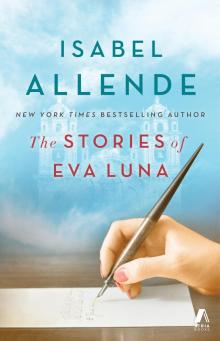 The Stories of Eva Luna
The Stories of Eva Luna The House of the Spirits
The House of the Spirits Paula
Paula Ines of My Soul
Ines of My Soul Of Love and Shadows
Of Love and Shadows Kingdom of the Golden Dragon
Kingdom of the Golden Dragon Daughter of Fortune
Daughter of Fortune City of the Beasts
City of the Beasts Maya's Notebook
Maya's Notebook Eva Luna
Eva Luna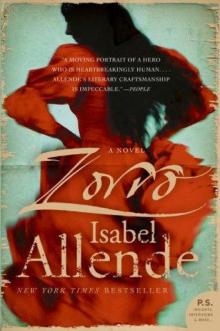 Zorro
Zorro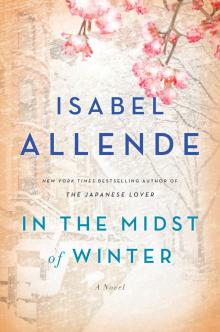 In the Midst of Winter
In the Midst of Winter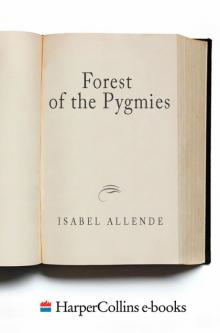 Forest of the Pygmies
Forest of the Pygmies My Invented Country: A Nostalgic Journey Through Chile
My Invented Country: A Nostalgic Journey Through Chile The Japanese Lover
The Japanese Lover Portrait in Sepia
Portrait in Sepia Island Beneath the Sea
Island Beneath the Sea The Soul of a Woman
The Soul of a Woman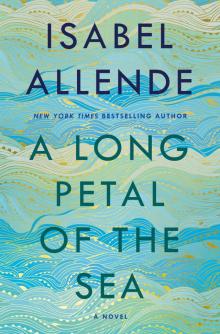 A Long Petal of the Sea
A Long Petal of the Sea Ines of My Soul: A Novel
Ines of My Soul: A Novel The Sum of Our Days
The Sum of Our Days